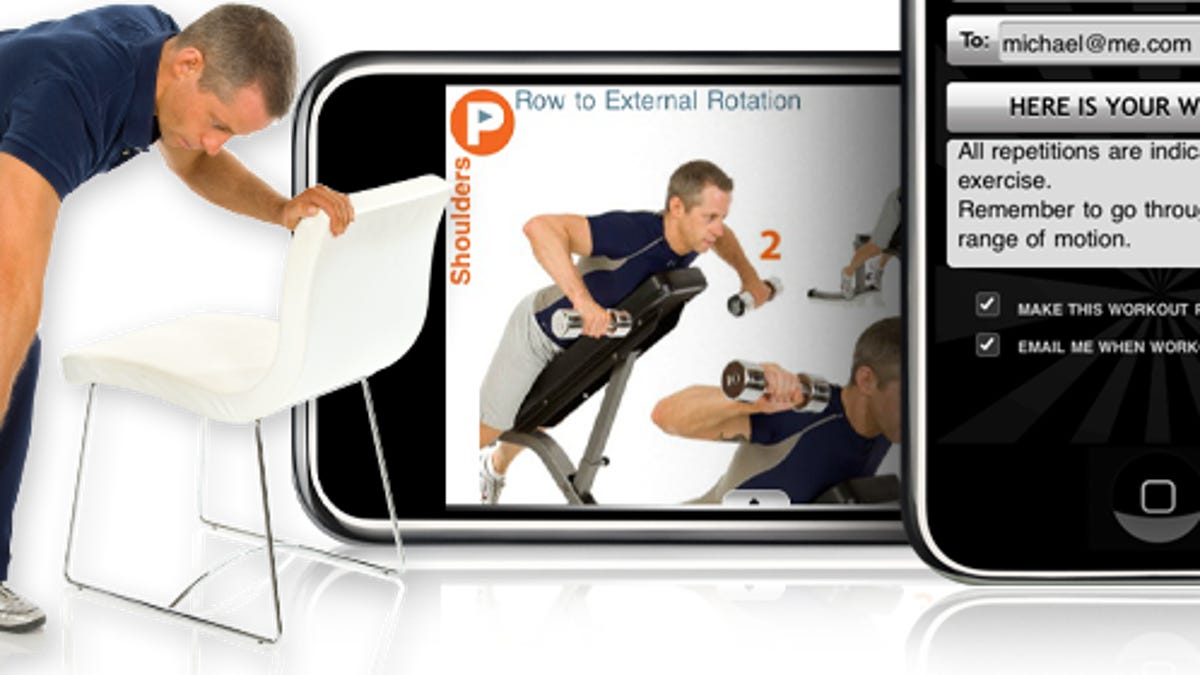PumpOne goes open source for the fitness fiends
Company about to introduce an iPhone app that connects patients with physical therapists and trainers, allowing the swapping of workouts and performance data.

OK New Years resolution types, if you're the kind of person who performs better when being watched, PumpOne's Fitness Builder app might help you hit a few goals in 2010. But first, heed the company's January 5 tweet: "TIP-Don't get caught up in the New Year's Resolution hype. Fitness should be part of your lifestyle, not a hobby for the next 3-4 weeks."
Touted as a top app from fitness publications and users alike, Fitness Builder's most recent version (2.4) was released in late December and includes a Share Workout feature by which users can not only e-mail specific workouts to specific contacts, but get into workout specs and create their own e-mailable versions. It's open-source for the fitness fiends.
If this sounds up your alley, shell out $9.99 (at the Apple store only) for the Fitness Builder app. Once you've got it on your iPhone, you can upgrade to Plus for an additional chunk of workouts and videos, or you can wait until March, when PumpOne co-founder and president Craig Schlossberg tells me his company plans to release Fitness Builder Pro (for personal trainers, for $19.99 a month) and Fitness Builder PT (for physical therapists, which comes with an extra 1,000 videos and images, for $49.99 a month).
"We're building what we think and know people will use and is going to be easy," Schlosser says. "Doctors are busy and won't spend hours of time reviewing videos. There is a lot of time spent in a session with a physical therapist explaining what is going on. That time can be spent working."
These professional versions build on the Share Workout feature, but include the ability for trainers and therapists to swap out the PumpOne logo with their own (this is perhaps Schlosser's favorite feature: "I mean, it really is crazy," he exclaims); to fully customize the workouts with their own images, videos, instructions, etc.; and to retrieve performance updates from patients once the workouts are done. If a workout is sent to someone without the app, that person simply clicks on a PDF with embedded images, printable instructions, etc.
The problem with physical therapy today, according to PumpOne:
A static image with text on a piece of paper leads to a compliance rate of 20 to 30 percent. These tools lack compliance checks and motivational incentives for the patient and offer very little customization to potential progress and/or variation. Additionally, the therapist must attempt to deliver a full repertoire of education early in the course of recovery knowing full well that much of the education will be lost by the time it is used--if at all.
Of course, the whole system relies on self-reporting, which Schlosser recognizes. There is nothing in this suite of apps that prevents or even discourages someone from simply lying about what was accomplished over the course of a given workout.
But technology alone isn't going to weed out those among us who are willing to shell out money for the app and not do the work. If this is you, consider investing instead in an app that yells at you each time you are cheating yourself.

